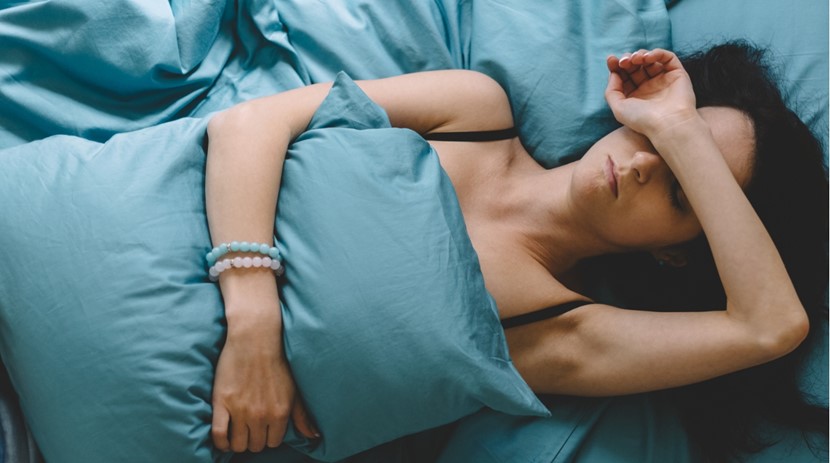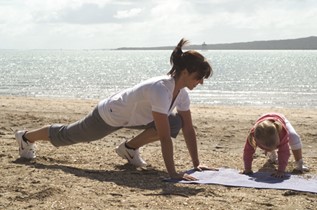A decent night's sleep

If you're pregnant or nursing a newborn, you'll know that sleep is a precious commodity. But why is it so hard to catch those zzz's, especially when everyone around you is saying, 'Get as much sleep as you can'? Sleep specialist Dr Alex Bartle explains.
While sleep for many people is taken for granted, it is often in the latter stages of their first pregnancy that women first experience the effects of sleep deprivation. Unless they are unlucky enough to suffer from severe nausea in the first stages of pregnancy, it is not until the tummy grows, and baby's movements become frequent, that restful sleeping becomes a challenge.
For those mums-to-be whose preferred sleeping position is on their stomach, sleeping on the side or back can be quite uncomfortable. In addition, lying for long periods on the back is not recommended. With back-sleeping, the pressure of the baby on the main vein returning blood to the heart is compressed, and the blood pressure tends to drop. Therefore, sleeping on your side, or with the body slightly raised, becomes necessary.
In addition, there are conditions that increasingly interfere with the quality of sleep as pregnancy progresses. Apart from frequent visits to the toilet, the two most common are snoring with the possibility of Obstructive Sleep apnoea (OSA), and restless Leg Syndrome (RLS).
Obstructive sleep apnoea 💤
Obstructive sleep apnoea (OSA) occurs as tissue tends to swell in the back of the throat in the later stages of pregnancy. Snoring then becomes louder and more persistent as the airway at the back of the throat becomes narrower and vibrates more. Finally, the throat snaps shut completely while breathing in, resulting in obstructive sleep apnoea. If this occurs repeatedly through the night, the sleep becomes broken and unrefreshing.
Restless leg syndrome 💤
Restless leg syndrome (RLS) is a little less understood, but is thought to be related to low iron content in the brain. This occurs more frequently, and often for the first time, in pregnancy, and results in a distressing "crawling" sensation in the sufferer's lower legs. Occasionally it can involve the whole leg, and even the lower trunk and arms, but it is always worse in the evening, or if sitting in a confined space such as in a plane or at the cinema. This discomfort is only relieved by stretching the legs, or walking around, and is generally gone by the morning. It can create difficulty getting to sleep, and may also result in repeated twitching of the legs during sleep. This again causes the sleep to become broken, and, like with OSA, results in unrefreshing sleep. Since this condition is related to low levels of brain iron, sometimes just an iron supplement is all that is required to relieve the symptoms.
Make it stop! 💤
Unfortunately, you may have to wait until your baby is born for OSA and RLS to leave you alone at night. Both of these conditions resolve with the birth of your baby. However, they are then replaced by a much more insistent disturbance! Read about baby's night waking.
It is generally recommended that responding to your baby at night is going to take priority in the first six months at least. This means accepting all the support that you can muster at that time, avoiding too much entertaining of doting grandparents and friends, and reminding your partner where to find the vacuum cleaner. Catch sleep whenever you can, as it becomes a precious commodity.
Post-baby insomnia 💤
It is not uncommon to see mothers in my sleep clinic who have first developed their insomnia when looking after their babies and children. For many, it is the ultimate form of shift work, as you're on duty 24 hours a day. The children then grow up and move away, but mother is left with the legacy of insomnia.
Whenever the insomnia started, and however long the "shift work" lasted, help is available through a number of behavioural strategies that have been developed over the past few years. as long as you have experienced normal, refreshing sleep at some stage in the past, it can be restored.
In the short term, sleeping tablets are very effective. However, there is always the danger that they become addictive, partly because they give such a good night's sleep. In general, they should be used for brief episodes of insomnia in the lowest effective dose, and usually for no more than a week. Otherwise, for both short-term and long-term insomnia, behavioural management is crucial.
Follow the rules 💤
There are a few simple rules to follow. At least, they are simple to write down, but not necessarily simple to do! They come under the headings "sleep hygiene", "stimulus control", and "sleep restriction".
Sleep hygiene involves the avoidance of all those daily activities and influences that may interfere with sleep. Stimulus control involves understanding your sleeping/waking cycle, and avoiding the association between anxiety and bed. Finally, sleep restriction involves improving sleep efficiency, or ensuring that most of your time in bed is spent asleep.
Sleep hygiene is important, but rarely effective on its own. Stimulus control is certainly more effective, and sleep restriction the most effective, but most difficult to follow.
While all parents of young children will be familiar with the ongoing challenge of being sleep-deprived, we are very poor at estimating the actual impact that it has on our thought processes and performance. In a recent laboratory test on truck drivers who had been artificially sleep deprived, one driver fell asleep for 10 minutes whilst driving the simulator, then awoke and continued down the road, unaware that he had been asleep at all!
In fact, 24 hours without sleep leaves us as incompetent as being over the limit with alcohol. Not only do we become poorly motivated, but we also suffer from reduced concentration and memory. We exhibit poor judgement, and increased risk-taking, with potentially serious consequences. Our enjoyment of life vanishes, as does our libido. Finally, our immunity suffers, and we become physically more susceptible to infections.
Sleep deprivation can wreck our lives at any time, but most consistently, it will be a part of early parenthood. For most people, this is short-lived and soon forgotten, but for a significant minority it becomes an ongoing, distressing part of our life.
Usually this destructive pattern of wakefulness can be resolved with behavioural treatment, and sleep restored to its rightful place.
Dr Alex Bartle MB BS (Lond), DipObst (Auck), PGDip Sleep Medicine (Syd) FRNZCGP was a GP in Christchurch for 30 years, and since 2000 has been running a sleep medicine practice. In 2007, Alex left general practice and now runs the Sleep Well clinics in Christchurch, Auckland, and Wellington full-time, assessing and treating all sleep disorders. Visit www.sleepwellclinic.co.nz for further information.

AS FEATURED IN ISSUE 3 OF OHbaby! MAGAZINE. CHECK OUT OTHER ARTICLES IN THIS ISSUE BELOW

















